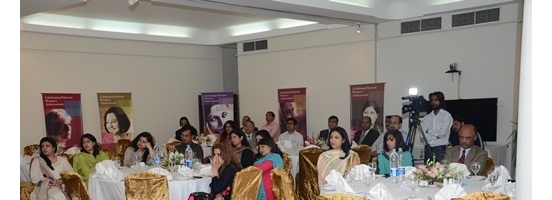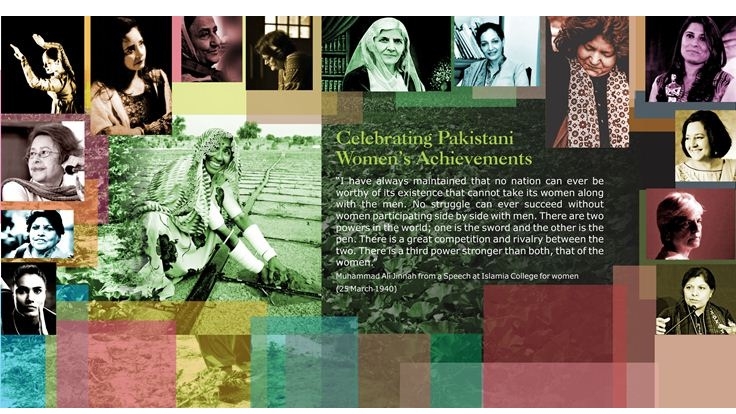Islamabad—Education and empowerment of women were the main messages emerging from a panel discussion on Celebrating Pakistani Women's Achievements hosted by the World Bank Pakistan in continuation of International Women's Day events on March 20, 2013. Three eminent Pakistani women shared their success stories and thoughts on women in Pakistani society with the audience. They included:
- Ms. Kishwar Naheed - renowned poet and Sitara-e-Imtiaz Pakistan (Star of Excellence) recipient for her literary contributions;
- Ms. Seema Aziz - entrepreneur, CEO of Sefam Pakistan, and Managing Trustee of the Care Foundation; and
- Ms. Sharmeen Obaid Chinoy - film maker and winner of a 2012 Academy Award for her documentary Saving Face.
Two questions framed the panel discussion. First, what has been the panelists’ key motivation for their work and success they have achieved, and secondly how can Pakistani women help Pakistan in the time ahead. This was followed by questions from the audience, made up of World Bank staff and members of the Interagency Gender and Development Group (INGAD).
All three panelists stated that it has been a struggle and journey to get to where they are today. Kishwar Naheed recalled how she had confronted staff who opposed her appointment as director of a publication because she was a woman, and in her civil service career adopted the mantra of ‘why not a woman?’ to do a job whenever her role was questioned on the basis of gender. In many respects, she said, it is men who need emancipation more than women in their thinking.
Education and empowerment of women was a theme consistently emphasized during the discussion. Education is the game changer and the great equalizer that allows empowerment of women which then carries through to wider society by changing attitudes, Seema Aziz said. Given that women are the teachers of the nation, “how empowered the women are is how empowered the children will be,” she said.
A great appetite for education exists in Pakistan. "There is a huge message of hope out there," Seema said, recalling that in her two decades of work in education, she has never met the poor who did not want to be educated or who did not want girls to go to school.
Her motivation in her work with Care, which has over 160,000 students in 240 schools it runs across the country, she said, comes from a desire to create the equality of opportunity which is essential for a level playing field for children. Given equal opportunities, women consistently do as well as or better than men.
“We all need to find the inner strength to talk about things people don’t want to talk about,” said Sharmeen Obaid Chinoy, explaining she has tried to do so from the time she started writing as a teenager in Karachi till today in the films she makes. “If you haven’t opened a door, it's because you haven’t kicked it hard enough,” she said.
There are many Pakistani women working for change throughout the country whose voices do not get heard, Sharmeen said, telling the audience a few of them. Their stories need to now be put forward and emphasized to serve as a motivation to others in Pakistan, both women and men, to work for positive change in society. She is making films on these stories, such as a village outside Multan whose reisdents worked to make it free of domestic violence. "Because of the voice that I have, I can help amplify [their] voice, and I think that is an important thing to do," she said.
The panelists acknowledged that the National Assembly which recently completed its term had passed many important bills related to women. Much work though remains to be done. Kishwar Naheed recommended a greater role for the National Commission on the Status of Women, and to issue National Identity Cards to the still large number of women who do not have them so they can access state and private services and, importantly, vote.
Seema Aziz reminded the audience that change ultimately does not come from governments but from people themselves. "No change gets given to you, no rights get given to you. You first have to know you want those rights, then you have to struggle for them, and then things happen. It's the only way change happens," she said.
The event ended with Kishwar reciting her famous poem, "We Sinful Women".
Watch Video Highlights of Panelists' Remarks
Kishwar Naheed |
Seema Aziz |
Sharmeen Obaid Chinoy |





